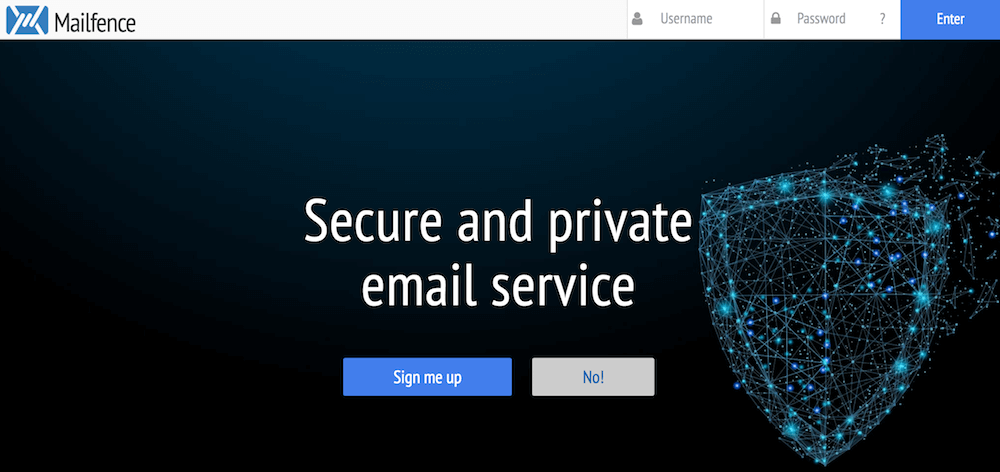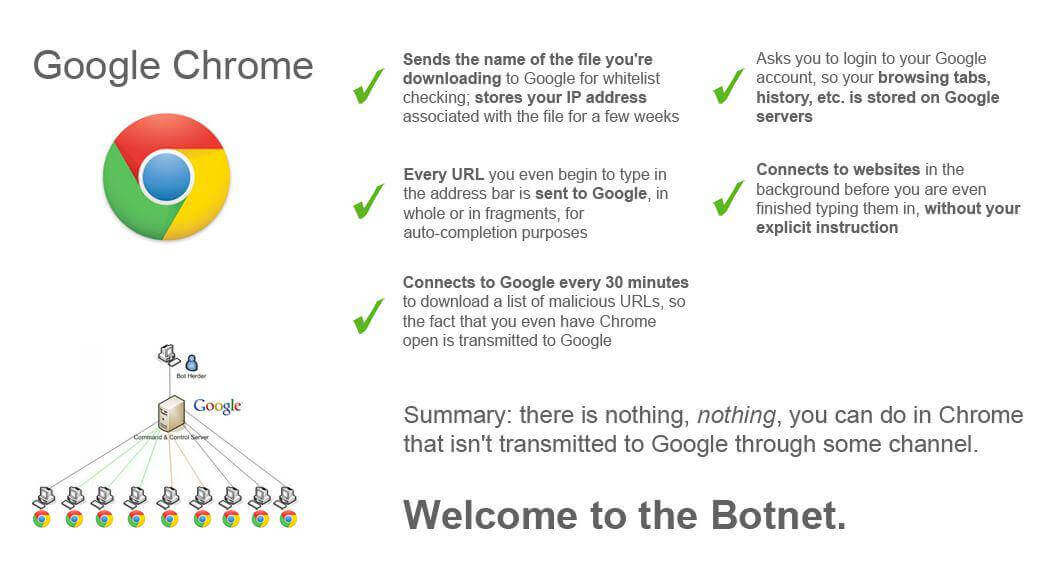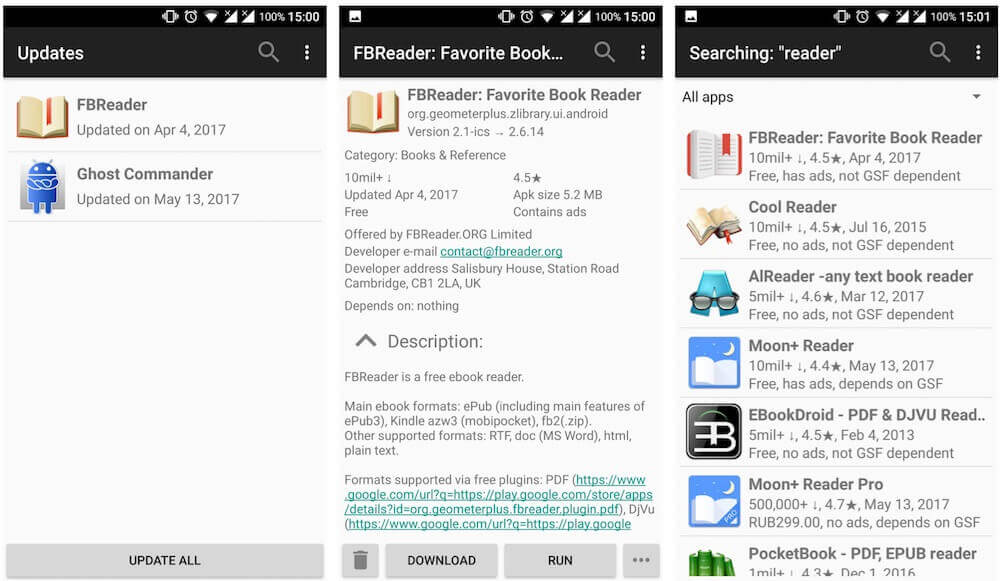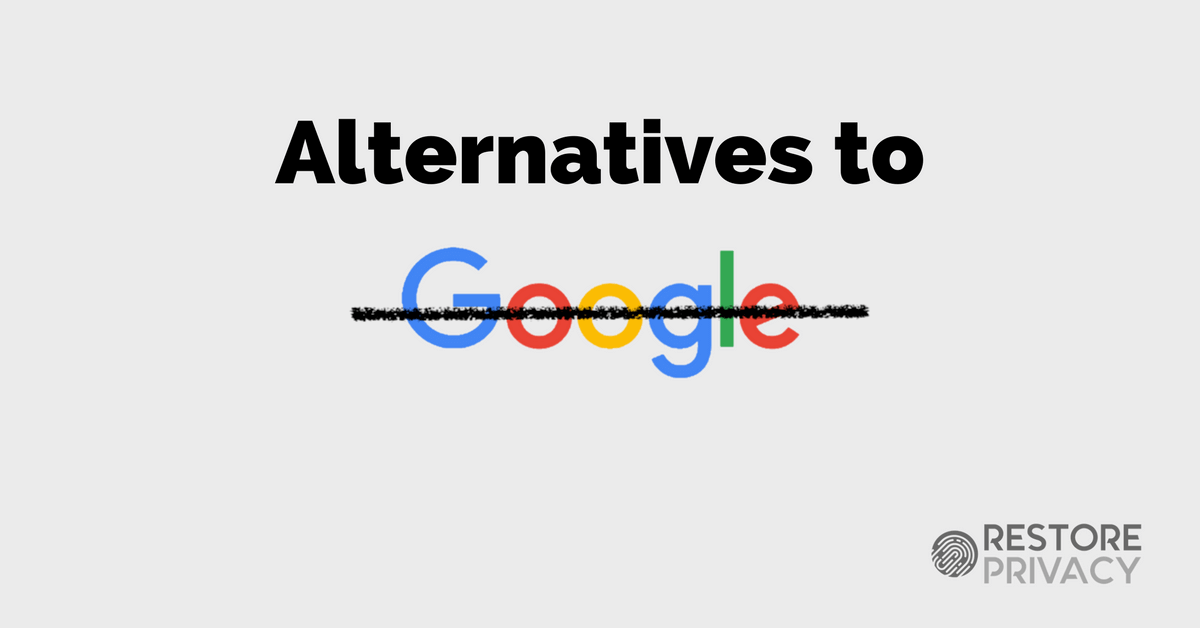Have you noticed? Google's entire business model is based on you surrendering to their corporate surveillance. That's it. All they do is repackage mass corporate surveillance into convenient, free, trendy applications that suck up all your data. Your private data helps Google dominate the online advertising market. You are the product.
Editor's Note:
Guest author Sven Taylor is the editor behind Restore Privacy, a blog dedicated to inform about best online privacy practices, secure your electronic devices, unblock restricted content and defeat censorship.
The other key issue to consider here is that Google is tracking and recording your activity in order to build a user profile, which can be used for various purposes. Google has many ways to track your activity, even if you are not logged into a Google account:
- Tracking through Google Adsense (all the banners you see on most websites also function as tracking)
- Tracking through YouTube and other Google-owned platforms and products
- Tracking through websites that use Google Analytics (most websites use Google Analytics)
All the data that Google collects about you is usually monetized through targeted advertising (Google is now the largest advertising company in the world). Your data may also be provided to government authorities. In other words, Google is working to track your every move online, even if you are working hard to avoid it.
The solution to this problem basically entails:
- Deleting your Google accounts and data
- Avoiding Google products and using alternatives (this guide)
- Using good privacy tools, such as a private browser and a good VPN service, which will help protect your data from third parties
Google search alternatives
When it comes to privacy, using Google search is not a good idea. When you use their search engine, Google is recording your IP address, search terms, user agent, and often a unique identifier, which is stored in cookies.
Here are a few Google search alternatives:
- Searx - A very privacy-friendly and versatile metasearch engine.
- Qwant - A private search engine based in France.
- Metager - A private search engine based in Germany.
- DuckDuckGo - This is a great privacy-friendly Google alternative that doesn't utilize tracking or targeted ads. They also have a zero-sharing policy with other features, but they do record search terms.
- StartPage - StartPage is gives you Google search results, but without the tracking.
Check out the private search engine guide for additional information.
Gmail alternatives
Gmail is one of the worst products you can use if you're concerned about privacy. Everything you do through Gmail is collected by the parent company - every email, attachment, and image... Using Gmail gives Google an intimate view of your private life and personal contacts.
When you remain logged in to your Gmail account, Google can easily track your activities online as you browse different websites, which may be hosting Google Analytics or Google ads (Adsense).
There are many different privacy email options; here are a five great choices:
- Mailfence - Based in Belgium - 500 MB free; 20 GB Pro
- Tutanota - Based in Germany - 1 GB free; 10 GB Pro
- Mailbox.org - Based in Germany - 2 GB storage
- Protonmail - Based in Switzerland - 500 MB free; 5 GB Pro
- Runbox - Based on Norway - 30 day free trial; 1 GB - 25 GB (paid plans)
You can try any of the options above to find the best Gmail alternative for your situation.

Some providers, such as Mailfence and Tutanota offer completely free accounts up to a certain storage limit.
Chrome alternatives
Google Chrome is a popular browser, but it's recording and tracking everything you do.
If you are a Chrome user, you may want to consider these alternatives instead:
- Firefox browser - This is a free, open-source internet browser that's quite popular. You can also use a variety of privacy add-ons that can block ads and tracking (but beware of browser fingerprinting).
- Tor browser - This is simply a hardened, privacy-friendly version of Firefox. You won't need any add-ons or extensions because it's already configured for privacy and security. That being said, it may be overkill for most users, because it will break many of the websites you visit (thanks to NoScript).
- Brave browser - Brave is a good browser with built-in privacy protections and ad blocking. However, it is also based on Chromium and is affected by the WebRTC leak issue.

Check out the Firefox privacy guide, which explains different privacy and security modifications you can make with Firefox.
Google Drive alternatives
If you're looking for a secure cloud storage option, you can check out these Google drive alternatives. They are more secure and better for protecting your privacy and data.
- TeamDrive - This is a business-oriented cloud backup and file synchronization option based in Germany.
- Tresorit - This is a user-friendly cloud storage option based in Switzerland. They offer client-side encryption, but also utilize Microsoft Windows servers, which is one drawback.
- Nextcloud - Nextcloud is an open source, self-hosted file share and communication platform. They are based in Germany.
YouTube alternatives
Unfortunately there doesn't seem to be many popular YouTube alternatives, but here are a few options:
- Vimeo
- Dailymotion
- Bitchute
- Hooktube
Hooktube - Hooktube is basically a YouTube proxy, which allows you to unblock YouTube videos, download videos, and get around YouTube censorship restrictions (unless YouTube deletes the video completely). This also helps to keep your data from Google.
How to use Hooktube: Just replace the domain in any YT link with hooktube.com and you get a light-weight page that loads YouTube's media files (mp4, webm, etc) directly into your browser's native media player. https://youtube.com/watch?v=S6bOkFLrsAc becomes https://hooktube.com/watch?v=S6bOkFLrsAc, etc. Supported parameters: start, end, loop (1 for on), speed (range: 0.01 to 4), autoplay (0 for off, default is 1).
And lastly, you can also check out the unblock YouTube guide for additional solutions.
Google analytics alternative
If you're running a website, it's important to see which content people like the most, so you can give your readers what they want. Otherwise publishing articles is like throwing darts blindfolded at a wall. Unfortunately, Google Analytics goes overboard with the tracking. Here are a few alternatives:
- Matomo (formerly Piwik) is a great open-source analytics program that respects the privacy of visitors by anonymizing and truncating visitor IP addresses. It's the only analytics service that is certified to respect user privacy (and the only analytics used on this site).
- Fathom Analytics is an open source alternative to Google Analytics that's available on Github here.
- Clicky is another alternative, but it does not have the built-in privacy protections of Matomo.
Many websites host Google Analytics because they run Google Adsense campaigns. Without Google Analytics, tracking performance of these campaigns would be difficult. Nonetheless, this is still bad for privacy.
Google Maps alternative
A map alternative for PCs is OpenStreetMap.
A few Google Maps alternatives for mobile devices include:
- OsmAnd is a free and open-source mobile maps app for both Android and iOS (based on OpenStreetMap data).
- Maps (F Droid) uses OpenStreetMap data (offline).
- Here WeGo provides good mapping solutions for both PCs and mobile devices with their app.
- Maps.Me is another option that is free on both Android and iOS, but there is a fair amount of data collection with this alternative, as explained in their privacy policy.
Google Play Store alternative
Currently the best Google Play Store alternative is to use F-Droid and then go through the Yalp store. As explained on the official site, F-Droid is an installable catalog of FOSS (Free and Open Source Software) applications for the Android platform.
After you have installed F-Droid, you can then download the Yalp store APK, which allows you to download apps from the Google Play Store directly as APK files.

The Yalp Store is a good alternative to the Google Play Store.
You can learn more about Yalp and download it from the F-Droid website here. (See also the official GitHub page here for more info.)
Google Calendar alternative
The best Google Calendar alternative seems to be Etar, which is open source, simple, and respects your privacy.
Another good option is the aCalendar from TAPIRapps. This appears to be another good option that respects your privacy and it also has some good features. Check it out on the official site here.
Two other Google Calendar alternatives are Kin and Fruxx. However, if you read through the privacy policies, it looks like Etar or aCalendar would be the better options. This is because both Kin and Fruux collect user/calendar data.
Some secure email providers also offer calendar options, such as Mailfence Calendar for example.
Do you care about your privacy?
Most people looking for Google alternatives have woken up to the fact that Google is awful for privacy because they collect as much of your private data as possible. But what about your internet service provider?
In the United States, United Kingdom, and Australia, internet service providers are also recording your online activity. This information can be legally sold to third parties (in the US), or saved in government databases to be potentially used against you (UK, US, and Australia). Aside from government surveillance agencies, there are many other third parties that are quietly tracking your online activity, such as Facebook.
One of the best tools for keeping your data out of the hands of third parties is to use a virtual private network. This will encrypt and anonymize your online activity, while also hiding your true IP address and location. The privacy tools guide discusses other solutions as well.
Do you have any other tips or suggestions for Google alternatives?
